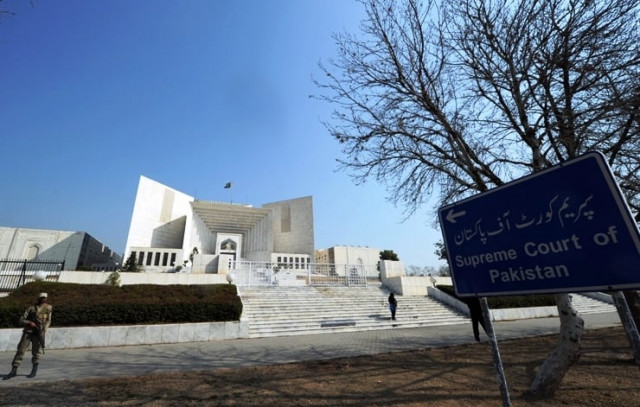Mining lease: Apex court tears up Reko Diq contract
Short order says Tethyan Copper Company no longer has any rights in agreement after its signing was found unlawful.

The bench observes that all amendments made to the agreement after its signing were unlawful and in contradiction with the agreement. PHOTO: AFP/FILE
The Supreme Court on Monday declared invalid the Reko Diq agreement – a lease for one of the world’s richest deposits of gold and copper in Balochistan held by the Tethyan Copper Company (TCC) – observing that the agreement ran counter to the country’s mineral development act and mining concession rules.
A three-judge bench of the apex court, headed by Chief Justice Iftikhar Muhammad Chaudhry, declared “not valid” the Chagai Hills Exploration Joint Venture Agreement (CHEJVA), the initial 1993 exploration agreement between the Balochistan government and Australian mining group BHP.
The bench issued a 16-page short order on identical petitions filed against the federal government’s decision to lease out gold and copper mines in Reko Diq to TCC – a Canadian-Chilean consortium of Barrick Gold and Antofagasta Minerals.
The apex court had earlier reserved its judgment after hearing the arguments of all the petitioners and respondents in the case on December 21, 2012.
“The CHEJVA dated 23.07.1993 is held to have been executed contrary to the provisions of the Mineral Development Act, 1948, the Mining Concession Rules, 1970 framed there under, the Contract Act, 1872, the Transfer of Property Act, 1882, etc., and is even otherwise not valid, therefore, the same is declared to be illegal, void and non est,” the ruling states.

The court maintained that the ‘Novation Agreement’ for the Reko Diq mining lease was purportedly drafted to substitute CHEJVA, adding that the Balochistan government was also made a party to the joint venture. The order went on to add that the agreement was not permissible under the Balochistan Mining Rules (BMR) 2002 as well as the Rules of Business of the Government of Balochistan (GOB), particularly Rule 7.
“The GOB, in purported exercise of the powers vested in it under the BMR 2002, granted relaxations in violation of Rule 98 ibid as no reason was assigned for the relaxation of the relevant Rules,” the order said.
The bench also observed that all amendments made to the agreement after its signing were unlawful and in contradiction with the agreement.
“The Addendum No. 1 dated 04.03.2000, Option Agreement dated 28.04.2000, Alliance Agreement dated 03.04.2002 and Novation Agreement dated 01.04.2006, which are based upon, and emanate from, CHEJVA are also held to be illegal and void,” the order read.

Earlier in December 2012, the International Centre for Settlement of Investment Disputes (ICSID) had given a go-ahead to the Balochistan government and prominent nuclear scientist Dr Samar Mubarakmand to carry out the mining and smelting project in Reko Diq area. The ICSID had rejected the TCC’s demand for ‘provisional measures’ for ‘protecting’ two of its deposit areas.
The tribunal was seized with the dispute between Pakistan and TCC after the latter’s application was rejected by the mining authority of Balochistan on the grounds that the company had submitted feasibility reports of only six kilometres area comprising two deposits, whereas it wanted to acquire 99 kilometres which contained 14 deposits.
Tethyan Copper Company
Reko Diq is one of the world’s richest deposits of gold and copper held by a Canadian-Chilean consortium that includes Vancouver-based giant Barrick Gold.
Barrick, the world’s largest gold producer, and Chile’s Antofagasta Minerals, each own a 37.5% share, as the Tethyan Copper Company, in the largest Foreign Direct Investment mining project in Pakistan.
Their plan was to build and operate a copper and gold open-pit mine at Reko Diq in the Chagai district of Balochistan.
Barrick and Antofagasta say the proposed plant could produce 600,000 tons of copper and 250,000 ounces of gold a year, but in 2011 work came to a standstill after Balochistan government refused to renew the consortium’s mining lease.
The Balochistan government is also the sleeping partner in the Reko Diq project with a 25 percent stake. Reasons for the dispute are murky, but some analysts suggest that China, a close Pakistan ally, is also interested in the deposits.
Experts say mining in Balochistan is dominated by small companies focused primarily on marble and granite, which waste up to 80% of mined minerals because of poor blasting techniques. Experts also call for more transparent policies to allow business to flourish. AFP
Published in The Express Tribune, January 8th, 2013.



















COMMENTS
Comments are moderated and generally will be posted if they are on-topic and not abusive.
For more information, please see our Comments FAQ